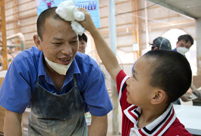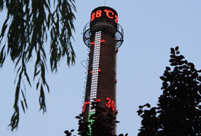 Amphibious armored vehicle unit conducts open sea drill
Amphibious armored vehicle unit conducts open sea drill
 Water relay in Henan
Water relay in Henan
 Ethnic culture feasts eyes of travelers
Ethnic culture feasts eyes of travelers
 80 security dogs assembled in Nanjing police dog training base
80 security dogs assembled in Nanjing police dog training base
 Graffiti artists paint on street walls in Xinjiang
Graffiti artists paint on street walls in Xinjiang
 Story of ceramic artist Zhang Lingyun
Story of ceramic artist Zhang Lingyun
 Magic summer night dream in Hongyuan
Magic summer night dream in Hongyuan
 Incredible creatures in headwaters drainage region of Lancang River
Incredible creatures in headwaters drainage region of Lancang River
 The future of rock n' roll seen in young rockers in China
The future of rock n' roll seen in young rockers in China
 Magnificent Yanziya Cliff
Magnificent Yanziya Cliff
Only a small percentage of sexual assault cases that occurred on Chinese campuses from January 2013 to May 2014 have been reported by public security or education authorities, an NGO's survey said this week.
The NGO - A Group on Women's Rights - is an online public-interest group comprising more than a dozen women, including mothers, lawyers, NGO workers and college students from regions and provinces that include Beijing, Guangzhou, Zhejiang and Henan.
They work together to collect information and conduct research about on-campus sexual assaults of girls and women, hoping that such cases can be reduced through intense information disclosure and public supervision.
In October and May, the organization sent out applications to 244 public security and education departments around China, asking them to disclose information about on-campus sexual assault cases under the condition that victims' privacy be protected. Only 19 departments responded with some information, accounting for 9 percent of all the departments the organization contacted.
The other 200-plus departments declined to cooperate, citing reasons such as the need to protect the victims' privacy and that the disclosure of such information will frighten students and their parents and would undermine social stability.
According to the 19 departments that disclosed some information, a total of 15 on-campus sexual assault cases happened within their jurisdictions since early 2013 - a number far lower than the organization collected from media reports.
"Our statistics show that at least 72 on-campus sexual assault cases were reported in the media between January 2013 and May 2014. These are only the ones exposed, but what about the unexposed?" said Liang Xiaowen, who compiled the organization's report.
Liang and her colleagues started paying attention to on-campus sexual assault in May 2013, when six primary school students were reported to have been sexually assaulted by their school principal. The case attracted nationwide attention.
The public attention didn't last long, said Liang, who used to study law at college and now volunteers for the organization in Guangzhou.
Meanwhile, Liang and her colleagues were sad to see similar cases still happening in some regions of China, and they began to wonder whether it would be better if local public security and education authorities disclosed more information, especially follow-up reports on these cases.
"In that sense, these cases can continuously attract public attention and supervision, and therefore they will be resolved better," Liang said.
However, Chu Zhaohui, a senior researcher at the National Institute of Education Sciences, has concerns about that approach.
Chu believes that information disclosure about on-campus sexual assault cases should be carried out only after making it clear which information can be disclosed, how the information can be disclosed properly, and to which people the information can be reported.
 Beijing policewomen posters become a hit
Beijing policewomen posters become a hit Armored regiment trains on the sea
Armored regiment trains on the sea Children spend 'Father's Day' with dads at work
Children spend 'Father's Day' with dads at work 'Pan Da' appear in Shanghai World Financial Center
'Pan Da' appear in Shanghai World Financial Center Champions take selfies on podium
Champions take selfies on podium National Fitness Day celebrated around China
National Fitness Day celebrated around China Traditional culture colors summer vacation
Traditional culture colors summer vacation Young athletes fighting for their dreams
Young athletes fighting for their dreams 68 meters high thermometer in Shanxi, called ‘fighter’ of thermometers
68 meters high thermometer in Shanxi, called ‘fighter’ of thermometers 22-year-old veteran travels around China
22-year-old veteran travels around China
 Night scenery of pagoda forests
Night scenery of pagoda forests China suffers from hot summer
China suffers from hot summer 48 hours after super Typhoon Rammasun
48 hours after super Typhoon Rammasun German pianist plays mid-air ‘magic carpet’ show over Munich Airport
German pianist plays mid-air ‘magic carpet’ show over Munich Airport
 China's manned deep-sea submersible conducts dive in Pacific Ocean
China's manned deep-sea submersible conducts dive in Pacific Ocean
Day|Week|Month